|

Autumn 2001 (9.3)
Pages
64-67
Secrets - No
More
Discovering
Who My Great Grandparents Were
by
Gulnar Aydamirova
  Beginning with the Red
Army's takeover of Baku in 1920 and continuing through Stalin's
brutal Repressions of the 1930s, Azerbaijanis endured a great
deal of suffering at the hands of early Soviet leaders. Yet,
later generations wholeheartedly accepted the Communist system,
even though many of their older relatives had been arrested and
exiled or executed. Beginning with the Red
Army's takeover of Baku in 1920 and continuing through Stalin's
brutal Repressions of the 1930s, Azerbaijanis endured a great
deal of suffering at the hands of early Soviet leaders. Yet,
later generations wholeheartedly accepted the Communist system,
even though many of their older relatives had been arrested and
exiled or executed.
Soviet children were reared to honor Lenin and have faith in
Communist ideology. It wasn't until the Black January massacre
of 1990 that many Azerbaijanis completely turned their backs
on the Soviet system. Many of them burned their Communist Party
membership cards in protest even though they had worked their
entire lives to get them.
I think we Azerbaijanis forget
things easily. On the one hand, this is probably a good trait
- we don't seem to be able to harbor hatred in our hearts very
long. But it also means we tend to forget things that should
never be forgotten.
Gulnar Aydamirova, 18, belongs to the generation of Azerbaijani
young people that is barely old enough to remember the collapse
of the Soviet Union. She was only eight years old in 1991, when
Azerbaijan became independent. Recently, she has been digging
into her family background to learn more about two of her great-grandfathers
who were executed by Soviet leaders and labeled as "Nation's
Enemies". She found that her family initially resisted the
Soviet system and endured severe consequences. Hers is a story
that could be told by many other Azerbaijanis.
When I was a
child, I used to say that I had five grandfathers: Allah baba
(God), my own two grandfathers, plus Shakhta baba (Santa Claus;
literally, Grandfather Frost). Though it's hard to believe now,
I always added Lenin baba (Grandfather Lenin) to my list as well.
Below:
Gulnar Aydamirova,
almost 7, in school uniform, proudly wearing her Octobrist star
with the portrait of Lenin as a young boy. Becoming an Octobrist
(referring to the October Revolution of 1917) was the first of
several steps up the ladder to becoming a Communist Party Member
in adulthood. Photo: 1989.
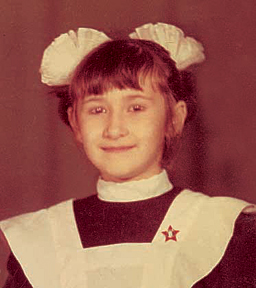  I don't know why I loved
Lenin so much; maybe it was because the ideology was so strong
back then. Lenin was considered the grandfather of all Soviet
children. I don't know why I loved
Lenin so much; maybe it was because the ideology was so strong
back then. Lenin was considered the grandfather of all Soviet
children.
I remember that I even had a picture book about his life. It
was my favorite book. My mom gave it to me when I was six. I
had just started first grade. The book told about Lenin's life,
mostly about his family and childhood. One picture showed him
surrounded by many children. This was meant to show that he was
a friend of every Soviet child. The book said that he had been
an excellent student and had studied hard and gone to school
half an hour early each day. No doubt there was a lesson there
that we were supposed to learn.
When I was in kindergarten, my class visited Lenin's Museum in
the heart of Baku. We were all very excited to go there. Actually,
I don't really remember much about the museum itself except that
there were a lot of pictures of Lenin standing in the midst of
many people. He was holding his cap in his hand. Even though
I don't remember the details, it still made an impression on
my young mind.
Today the museum building still exists, but the Lenin memorabilia
is gone and in its place is a large exhibition of carpets from
all the regions of Azerbaijan. Who knows where all that stuff
related to Lenin is now?
When I was seven years old, I became an "Oktobrist",
which refers to the October 1917 Bolshevik Revolution in Russia,
when the Soviets came to power. As an Oktobrist, I used to wear
a little pin in the shape of a star. There was a portrait of
Lenin as a young boy on it. For kids in Grades 1-4, it was the
initial step up the ladder to becoming a member of the Communist
Party. After that, I was supposed to become a Pioneer, and then
a Komsomol.
The Soviet Union collapsed when I was eight years old, so I never
did become a Pioneer or a Komsomol.
Today, less than a decade later, it seems that many young children
in Azerbaijan don't even know who Lenin was. My sister is nine
year old and in the fourth grade. She was born in 1992, only
a year after Azerbaijan became independent. When I asked her
and a 12-year-old neighbor boy who Lenin was, my sister thought
for a moment, but the only thing she could tell me was that he
was Russian. Her friend said that Lenin was the president.
Below:
The Afandi
Family. Zabishah Afandi (my grandmother's brother who was executed
because of his father) is the third from the left on the second
row. The elderly woman next to him is Khanim baji, the mother
of my great-grandfather (Hamdulla Afandi's) mother. His wife,
my great-grandmother (Nurjahan Afandizade), is the second from
the left on the third row. The little girl she is holding is
my grandmother, Zihajja Aliyeva. Others include my great-grandfather's
other wives, children and nephews. This photo was taken before
Stalin sent my family into exile in 1926. My great grandfather
Hamdulla Afandi, who was a member of the Azerbaijan Democratic
Parliament (1918-1920) and later executed in 1926, is not pictured
here. Photo is from around 1925.
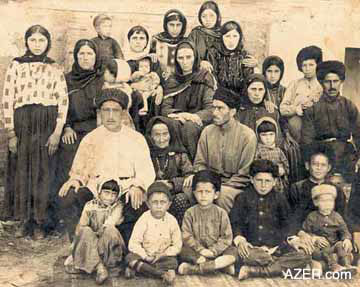  When I was her age,
I knew a lot about Lenin. At least I knew what we had been taught
at school. But at the same time, it's only been since independence
that I've begun to realize how many problems Lenin and other
Soviet leaders caused my family. When I was her age,
I knew a lot about Lenin. At least I knew what we had been taught
at school. But at the same time, it's only been since independence
that I've begun to realize how many problems Lenin and other
Soviet leaders caused my family.
Digging in the
Past
I'm not sure when I first started hearing stories from my mother
about my family's history; it seems like a long time ago. But
lately, I've been digging into my background more systematically.
I've been talking to my grandparents on my mother's side, both
78 years old now. They were both eager to share their stories.
I've always known that one of my great-grandfathers was executed
for being an "Enemy of the Nation", but there were
so many other things that I didn't know. For example, I didn't
know that he had been a Member of Parliament in the Azerbaijan
Democratic Republic (ADR) (1918-1920). Nor did I know how difficult
life had been for my grandfather's family after he was executed.
I also didn't know that my grandmother's stepbrother had been
killed.
My great-grandfather Hamdulla Afandi Afandizade (killed in 1926)
was a bey (landowner) in the Galagah village of the Davachi region,
in northeast Azerbaijan. Relatively well off, he lived in a rather
large house with his four wives and 14 children. (Wealthy men
back then often had more than one wife.) The Afandi family had
been respected in the region for quite a long time.
My great-grandfather lived during turbulent times. In the spring
of 1920, when the 11th Red Army was moving from Yalama (in northeastern
Azerbaijan, bordering Dagestan) to Baku, my great-grandfather
gathered people from the Guba and Davachi regions to fight against
the troops. Through their efforts, they were able to head off
the train that was moving troops to Baku. But of course, they
couldn't resist long against such a large army. They somehow
succeeded in delaying the train by a few days - at least, that's the way my grandparents
tell it.
Below:
My great
grandfather Ali Aliyev, a mullah, was killed in 1937 at the height
of Stalin's Repressions.
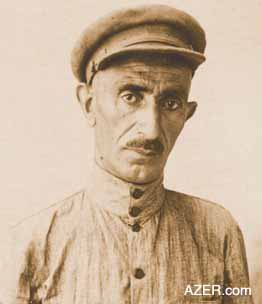  My great-grandfather's
brave efforts to protect Azerbaijan soon caught up with him.
In 1926 he was arrested and never heard from again. The Bolshevik
leaders called him an "Enemy of the Nation" and then
executed him. His body has never been returned to his family.
Nobody really knows what happened to him. My great-grandfather's
brave efforts to protect Azerbaijan soon caught up with him.
In 1926 he was arrested and never heard from again. The Bolshevik
leaders called him an "Enemy of the Nation" and then
executed him. His body has never been returned to his family.
Nobody really knows what happened to him.
More Troubles
But that wasn't the end of troubles for my family. Their house
and belongings were confiscated. My great-grandfather's wives
managed to hold on to some of their jewelry, but it was nothing
compared to what they had once owned. They passed some of their
belongings to people in the village for safekeeping. But they
never got anything back.
Then his family and all of his relatives were exiled to Nakhchivan,
the non-contiguous part of Azerbaijan bordering Turkey, separated
from mainland Azerbaijan by a strip of Armenia. Then they went
to Gazakh, the northwest corner of Azerbaijan bordering Georgia.
My grandmother's older stepbrother Zabishah Afandizade was a
teacher. One day he told his stepmother that some people had
been asking about him. He knew that they were going to come and
take him away, and he didn't want it to happen while his children
were watching. My great-grandmother suggested that he stay at
her house. But he decided against it as he didn't want to leave
his own children alone.
Just as he had predicted, they arrested him and took him to prison
the very next day. His crime? He just happened to be the son
of an "Enemy of the Nation." The next day, my great-grandmother
and grandmother went to visit him in prison and take some food,
even though it was very risky to do so. The following day, they
went again, but the prison guards told them that he had already
been shot. That was 1937, during the height of Stalin's Repression.
Tens of thousands of people disappeared during those days.
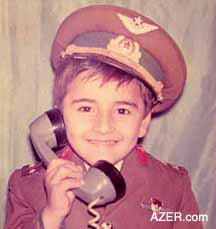  Above: My brother, Nariman
Aydamirov, loved dressing up in uniforms that were worn during
the Soviet period. This photo was taken at age 5 in kindergarten,
in December 1990. Above: My brother, Nariman
Aydamirov, loved dressing up in uniforms that were worn during
the Soviet period. This photo was taken at age 5 in kindergarten,
in December 1990.
My grandmother's
family continued living with this curse up until Stalin's death
(1953) and the subsequent trial of Mir Jafar Baghirov in 1954.
Since one of their family members had been declared an "Enemy
of the Nation" who had opposed the Soviets, the family encountered
difficulties everywhere they turned. They even tried changing
their last name from Afandizade to Ismayilov, just so people
wouldn't know that they were related to such a family (Ismayil
happened to be the name of Hamdulla Afandi's father).
My grandmother's older brother had received an assignment to
teach in Davachi, the region that they were from. But it didn't
work out because the people there were always pointing at him.
So he had to request a different teaching assignment in Khudat,
where no one knew who he was.
Religious Persecution
Another one of my great-grandfathers, Ali Aliyev (killed in 1937),
was also a victim of the Soviet regime because he was a mullah,
a religious man. People used to call him Mullah Ali. He lived
in Galaghan village.
Mullah Ali was known as a very kind man who always helped needy
people. My great-grandmother used to say that she had never washed
two pairs of pants for him at the same time, meaning that if
he ever had an extra pair, he always gave them to someone else
who needed them.
When the Soviets took power, they began killing the mullahs,
burning mosques and destroying everything that was written in
Arabic script [At that time, the Azeri language was written in
Arabic script]. My great-grandfather knew that he, too, would
be targeted, so he decided to leave the area. From 1930 to 1937
he lived here and there, mostly hiding out in the southern regions
of the country. He would sometimes come back at night to visit
his wife and three sons. Mullah Ali would never stay long and
always left before dawn.
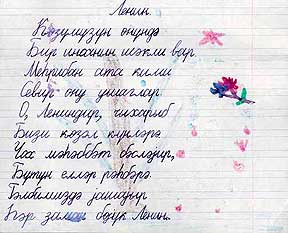  Lenin Lenin
Left:
Gulnar's
poem at age 7 (1990) to her uncle, which she copied from a school
book featuring Lenin. Gulnar used to call Lenin one of her "Baba's"
(grandfathers).
There's a picture of one person
in front of our eyes.
Kids love him as a kind father.
He is Lenin, he has taken us to beautiful days.
All the nations love the leader deeply.
Great Lenin always lives in our hearts.
He was a close friend of every nation and every country.
His youngest
son (my mother's uncle) doesn't even remember his father, as
he was very young at the time. But he does remember a dream that
he had, in which he woke up and found that a man was holding
him. He says he recalls how the man kissed him on the forehead.
He remembers the man's face vividly and has never forgotten it.
Perhaps the memory dates from one of those nights when Mullah
Ali came to visit his family.
My grandfather recalls one night when his father came back for
a brief visit. When he was leaving, a neighbor spotted him and
ran to tell on him to the village authorities. Back then, some
people used to spy on their neighbors to gain favor with authorities
in the Soviet system. You couldn't trust anyone.
But by the time the neighbor returned with several men, my great-grandfather
had disappeared. They asked my grandmother where he had gone.
She was young and alone, with her three young sons. She snapped
back at the neighbor: "What kind of person are you? Didn't
you just see him off yourself, and now you come and ask me where
he is?" Of course, later the neighbor had some explaining
to do.
My great-grandmother grew to hate the Soviet system. But she
never spoke about it much as she was very afraid. My mother recalls
that she used to warn them that "even walls have ears"
[now a traditional Azeri saying].
Mullah Ali owned a lot of books that were written in the Arabic
script. He used to say that each one of them had the value of
a bull calf. Since the Soviets tried to eradicate everything
associated with Islam, including secular books written in this
script, his family knew their house would be searched. They asked
many people to keep the books, but no one would. Finally, they
tossed the precious books into the river. He remembers watching
them float by in the water.
No one saw or heard from my great-grandfather after 1937. He
just disappeared. Later, someone said that he had seen him at
a certain place. People went looking for him, but no one found
him. My great-grandmother believed that if he had really been
alive, he would have come and visited them, no matter how great
the risk. But he never came.
From then on, my grandfather's family also became targeted as
a family of an "Enemy of the Nation." His sons had
difficulty pursuing their studies. For instance, when my grandfather
and a neighbor friend went to the nearby town of Guba to take
the entrance exam for technical secondary school to become teachers,
they were told to leave the classroom. They were singled out
because of their fathers. Another teacher, who was sympathetic
to their situation, invited them to return to the classroom.
The next day, that teacher disappeared. It turns out, the authorities
had been watching him for some time.
My grandfather and his brothers weren't allowed to become members
of the Communist Party. Of course, they never really wanted to.
At the time, though, it was important to be a Party member. The
youngest son -
the one who had never remembered seeing his father - eventually did become
a Party member.
Revolutionaries
Surprisingly, I also discovered that I had a few famous Communist
revolutionaries in my family: Gazanfar Musabeyov (1888-1938)
and Ayna Sultanova (1895-1938). This brother and sister were
cousins to my great-grandfather Hamdulla Afandi.
The two of them worked hard to establish Soviet rule in Azerbaijan.
They say that Gazanfar met with Lenin on several occasions and
passed him information about the situation in Azerbaijan. He
served as head of the Republic's People's Commissars' Union from
1922 to 1929, then became a leader of the Caucasian Federation's
Central Revolutionary Committee. From 1931 to 1937, he was the
head of the Caucasian Federation's People's Commissars' Union.
His sister Ayna organized the Women's Section of the Azerbaijan
Communist Party's Central Committee. She also served as the first
editor of "Eastern Woman" (Sherq Qadini) magazine,
which later became "Azerbaijani Woman" (Azerbaycan
Qadini). She held other high positions including Commissar of
the Azerbaijan Educational Commissariat, head of the Culture
department of the Caucasian Federation's Trade Union Council
and head of the women's department in the Caucasian Country Committee.
Even though these two held high positions in the Communist Party,
they enjoyed no immunity from the terror of that system. In 1938,
during Stalin's Repression, they were both denounced as "Enemies
of the Nation" and executed. Ayna's husband, Hamid Sultanov,
was killed that year as well. All of a sudden, the Soviet system
didn't seem to need them anymore. Maybe they knew too many of
the Party's secrets and were seen as a threat.
Mother's Generation
By the time my mother was growing up in the 1960s, the family's
situation had changed considerably; it was almost like a complete
reversal. By that time, most of the stigma of being related to
an "Enemy of the Nation" had disappeared. Nearly a
decade had passed since Stalin's death, and the Repressions were
over. Krushchev's era was known as a "thawing" period
when more freedom was given. It was a swing of the pendulum to
try to counter some of the harshness of Stalin's era.
When Mom was growing up, she became an Oktobrist, then a Pioneer,
and eventually a Komsomol. She says that the Communist ideology
and propaganda was so strong at the time that she really believed
in it.
"It was an honor to become a Pioneer," she told me.
"Everyone aspired to be one. I remember that we had to answer
several questions before we were accepted to be Pioneers. It
would have been embarrassing and shameful not to become one."
As a teenager, she took the next step by becoming a Komsomol.
"I worried so much about taking the exam," my mother
told me. "We were asked a lot of questions about the history
of the Communist Party and its Congresses. It was a big deal,
and there was a special acceptance ceremony."
It seems strange to me that after all that my family had suffered,
my mother and her generation didn't hate the Soviet system. When
I asked her about this, she said that her parents had not taught
them to hate the system. It seems they must not have wanted their
children to suffer as they had. Of course, they knew that if
their children said anything negative about the government to
their friends or at school, the whole family could be jeopardized
again. It was for this reason that children weren't taught the
whole truth. Looking back, you have to give the parents credit
for succeeding in just keeping their families alive.
I think we Azerbaijanis forget things easily. On the one hand,
this is probably a good trait - we don't seem to be able to harbor hatred in
our hearts very long. But on the other hand, we tend to forget
things that should never be forgotten.
Now that I've learned more about my family, I have a newfound
sense of respect for my ancestors. I'm sorry that I never knew
them personally. They believed in the independence of our country.
They wanted freedom. They only lived through two years of independence
(1918-1920), but they believed in it so much that they fought
to protect it. My family tree is full of individuals who suffered
as "Enemies of the Nation" - but to me, I can at last look at them
from a perspective that makes me respect them as great heroes.
Gulnar Aydamirova
(1983- ) was selected as a foreign high school exchange student
in Colorado (school year 1999-2000) in a program sponsored by
the U.S. Freedom Support Act. She joined the editorial staff
at Azerbaijan International magazine and is currently pursuing
a bachelor's degree in Linguistics at the University of Languages
in Baku.
____
From Azerbaijan
International
(9.3) Autumn 2001.
© Azerbaijan International 2001. All rights reserved.
Back to Index
AI 9.3 (Autumn 2001)
AI Home
| Magazine
Choice
| Topics
| AI Store | Contact us
Other Web sites
created by Azerbaijan International
AZgallery.org | AZERI.org | HAJIBEYOV.com
|






